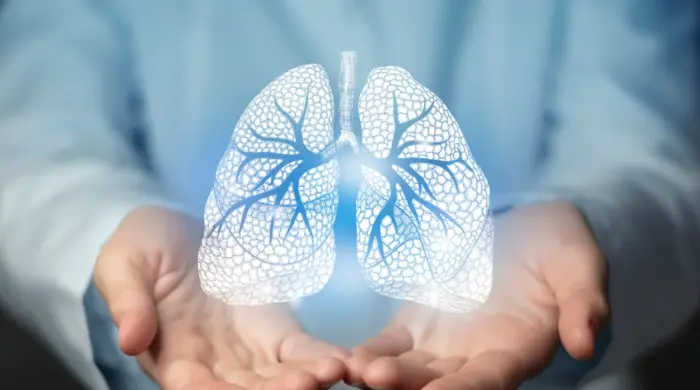Although most people don’t think about lung health until symptoms of a condition surface, it’s important to take care of your lungs because they’re responsible for keeping organs oxygenated so your body can function on a daily basis.
October is Healthy Lung Month – a time to consider the importance of keeping your lungs healthy.
What is lung health and why does it matter?
Though you may not often think about it, the simple act of breathing is a complex process. When you inhale, the lungs receive oxygen, which is picked up by the blood and delivered throughout your body. When you exhale, air moves out of the lungs and carbon dioxide is released as a waste product.
Healthy lungs are able to perform these actions when they are flexible and strong enough to squeeze and expand with each breath you take. Without a regular supply of fresh oxygen, our organs could be compromised or fail, resulting in serious health issues.
Because we breathe whether we think about it or not, concerns with respiratory health are sometimes ignored until they escalate into more serious conditions.
Hazards to the lungs
It may come as no surprise that one of the greatest hazards to your lungs is smoke. Smoking cigarettes directly damages the lungs, as well as secondhand smoke or smoke inhaled from vehicle exhaust and natural sources such as wildfires.
Environmental pollutants that we encounter every day may be hard to avoid, such as air pollution, chemicals, toxins, or carcinogens such as asbestos in buildings. All of these can negatively impact lung health.
In addition, common allergens such as dust mites, pollen, and mold can also have a detrimental effect on the respiratory system. If you have symptoms or reactions to any or all of these, it’s helpful to get tested and confirm exactly what is affecting you, then proceed with treatment to help minimize the impact on your lungs.
Symptoms of lung problems
How can you be sure if your lungs are healthy or not? Symptoms that may indicate compromised lung function include:
- Chronic, persistent cough
- Breathlessness or shortness of breath during physical activities
- Chest tightness
- Frequent respiratory infections
- Fatigue/ lack of energy
- Decrease in ability to exercise
- Pain or discomfort when breathing
- Swelling in ankles, feet or legs
If you experience any or all of these symptoms, consult with a pulmonary doctor as soon as possible for an assessment and a diagnosis of your condition.
Common lung conditions
According to the American Cancer Society, lung cancer is the second most common cancer in the United States, and it is the leading cause of cancer deaths. More people die from lung cancer than of breast, colon and prostate cancers combined.
In addition to cancer, the lung disorders that our Pulmonologists treat the most frequently include asthma, bronchitis, COPD, chronic cough, pneumonia, interstitial lung disease such as fibrosis, lung nodules, pleural effusions, and sleep apnea. Sleep disorders are considered serious lung conditions because of the way that breathing is negatively impacted.
WWMG’s board-certified Pulmonary Specialists can diagnose disorders of the lungs and respiratory system, and work with patients to design a customized treatment plan to help them manage symptoms and support their quality of life.
Tips to keep your lungs healthy
Prevention is key to keeping respiratory concerns from becoming serious health conditions. Here are just a few ways to maintain strong lungs:
- Exercise. Regular exercise is an excellent way to care for your lungs. Your lungs actually get stronger because they have to physically work harder when you’re active, so regular, rigorous exercise helps your body become more efficient at receiving oxygen into the bloodstream and transporting it to your working muscles.
- Avoid exposure to pollutants. Some exposure to environmental pollution is unavoidable. However, in the instances where you’re able to control your environment (such as when the air quality is listed as “poor”), stay indoors and minimize the amount of time you spend outside.
- Don’t smoke or quit smoking. Smoking is hazardous to your lungs and your long-term health. If you smoke, consider quitting. If you don’t smoke, don’t start.
- Get vaccinated. The healthier you keep yourself, the less likely you are to contract infections that can weaken your lungs. Stay up to date with vaccinations for influenza, COVID-19, and if applicable, pneumonia.
- See a doctor. Regular check-ups, even in times of assumed good health, can reveal unknown issues before they become serious. Stay on top of annual physical exams and preventative check-ins with your primary care provider.
- Get screened. After age 55, if you’re a regular smoker or a former smoker, you should be screened for lung cancer. This also applies if you’re at high risk due to personal or family medical history. In the event that you are diagnosed with lung cancer, early detection can be crucial to effective treatment and survival. In addition to lung cancer, these screenings can detect other serious pulmonary issues that would otherwise remain undetected.
- Participate in a research study. If you’re between the ages of 50 and 80, and have a 20 pack/year smoking habit (1 pack/day for 20 years or 2 packs/day for 10 years), you may be eligible to participate in a clinical trial for lung cancer screening. Apply online to participate a research study at WWMG, to help others and contribute to moving science forward.
Make Your Respiratory Health Top Priority
October is Healthy Lung Month, an important time to prioritize your respiratory health. If you’re experiencing shortness of breath, sleep problems, or chronic breathing issues, request an appointment today with a WWMG Pulmonary specialist. Our doctors work with patients every day to diagnose lung disorders and recommend appropriate, personalized treatment to reduce or manage symptoms and improve your quality of life.
